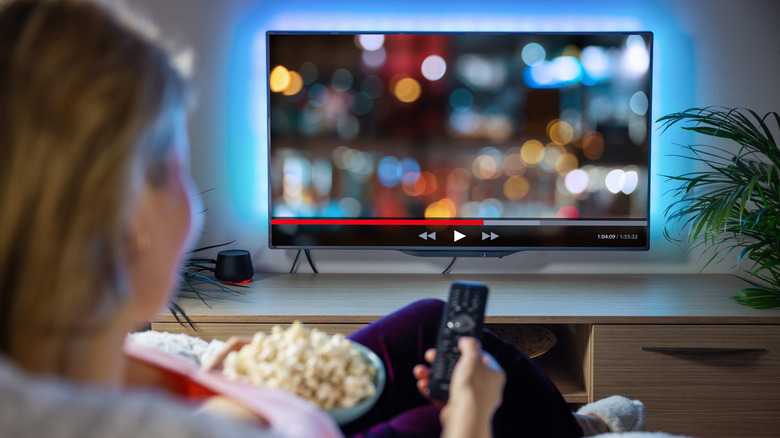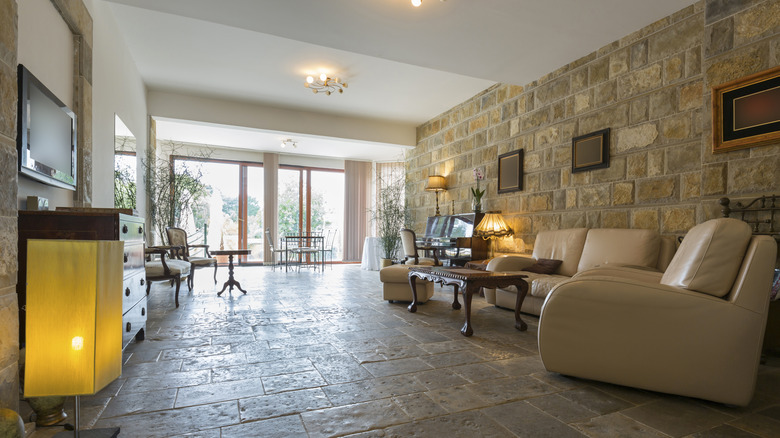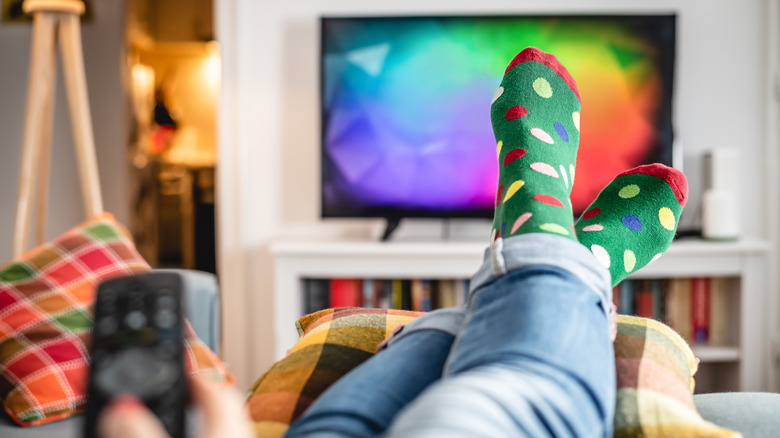Here's The Perfect Feng Shui Placement For Your TV
Finding a spot for your TV might be narrowed down to available wall space, but if given the opportunity to choose, why not consult the wisdom of the ancient Chinese practice of feng shui to find the perfect place? According to feng shui logic, we should strive to keep our homes simple and clutter-free in order to promote a harmonious life. But, unfortunately, those television sets we love so much are harbingers of chaotic energies that are disruptive to our health and environment, especially in places of gathering and rest, says Dana Claudat, a modern feng shui master.
Even so, balance can still be achieved with proper placement of furniture and mindful design that emphasizes good flow throughout the home. The guiding principles of feng shui make the design process easier, and yet, consult any number of feng shui teachers about where to put the TV, and you'll get just as many answers ... So, what's the right answer? Simply follow the principles as best you can for the space you have and for what you want it to become.
Let's look at ideas for TV placement in the living room that align with feng shui rules.
Feng shui for your living room
A living room is typically filled with several pieces of furniture, but the couch and TV are usually the most prominent. Situating the television opposite the couch is optimal for viewing and incorporates balance, says Roomlay. The size of an item also impacts the energy of a room, so the TV needs to be proportionate to the space and other furniture.
Another important rule is to not back things up against a window, according to Red Lotus Letter. In feng shui, this creates vulnerability and crimps the flow of positive vibes. Another destroyer of good chi is clutter, and a tangle of cords looks messy. So, make sure to find a way to keep those tidy and out of sight.
If you're still unsure of where to put your TV in the living room, consult the bagua (energy) map. This feng shui tool uses the 5 elements of water, fire, wood, earth, and metal with cardinal directions (like a compass) as an outline of energy in your house. A bagua has eight sides and a center, with each corresponding to nine different aspects of life. The Chinese Zodiac explains that in order to use the map, begin with assigning the front door to the career portion of the bagua (or if you're applying the map to just a single room, apply it to the entrance of that space). From there, place the TV on the wall that makes the most sense.
What Feng Shui says about TVs in other rooms
In today's homes, it's common for TVs to be used in bedrooms, family rooms, kitchens, and sometimes in bathrooms and outdoor spaces. Wind & Water Center says to think of the purpose of the room when deciding if a TV is a good idea. Ask yourself if having that distraction is what you want for that particular space. If the answer is yes, then proceed with a bagua map for each room.
Traditional feng shui principles discourage TVs in homes altogether, especially in bedrooms where rest is to be achieved. But that's unrealistic as at least 64% of households have one in their snooze rooms, says Each Night. The problem with a television is that it's very good at its job, which is to entertain. And they tend to take our focus from other, more positive exchanges of energy such as undisrupted sleep and interactions with family and friends.
Luckily, there's a way to alter the effect of the TV in any room by unplugging it and covering it up when not in use. According to Shore Home Solutions, regardless of the room, a TV should be hidden or kept out of sight when not in use as a perfect feng shui solution that declutters the negative energy and cleans things up aesthetically, thereby promoting good chi or energy. Yes, you can have a TV and good chi at the same time!


